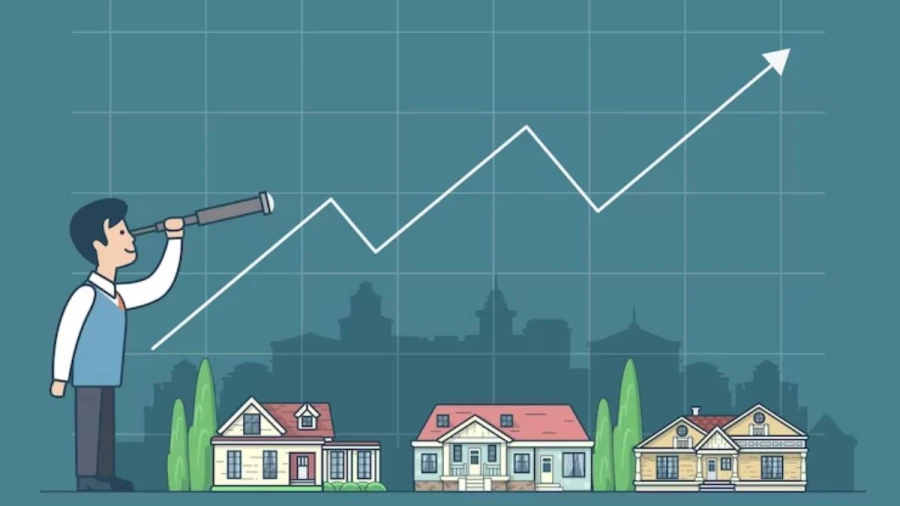
Housing Market Crash Prediction 2024, When Will the Housing Market Crash?
While concerns about the 2024 housing market exist due to factors such as rising interest rates and inflation, including tighter lending standards and higher homeowner equity, make a direct comparison less likely and a widespread crash less imminent.
Published Aug 11, 2023 | Updated Jan 05, 2024 | 📖 5 min read
Housing Market Crash Prediction 2024
Predicting the exact timing of a housing market crash is challenging, as it depends on various economic factors. In 2024, the US housing market faces challenges like rising interest rates, inflation, and the possibility of a recession, which could contribute to a slowdown in home price growth or even a crash.
Experts have differing opinions on the market's resilience, with some foreseeing an imminent crash due to overheating, while others believe increased demand from millennials may act as a buffer. Despite millennials making up the largest share of home buyers at 43%, challenges such as student debt hinder some from entering the housing market, potentially impacting its stability in the coming years.
When Will the Housing Market Crash?
The current economic landscape is characterized by rising inflation and concerns about a potential recession. While some experts express concerns about the possibility of a housing bubble, the majority of real estate professionals do not see the housing market as an imminent threat to the overall economy.
It's essential to consider historical contexts, as not all economic downturns have had the same impact on the real estate market. The housing market has faced significant challenges in the past, with the 2007 Great Recession being a notable example, but economic conditions and their effects on housing can vary.
What Factors Contribute to a Housing Market Crash?
The housing market's stability is influenced by various factors, and concerns about a potential crash in 2024 are fueled by rising interest rates, surging inflation at a 40-year high, and looming warnings of an impending recession.
These elements intertwine to shape the dynamics of real estate, impacting affordability and demand for homes. Understanding these factors is crucial in navigating the complexities of the housing market landscape.
Rising Interest Rates
The Federal Reserve's decision to raise interest rates is a strategy to curb inflation. However, this move has implications for the housing market as it increases the cost of borrowing for mortgages. The higher interest rates could potentially deter prospective homebuyers, leading to a decline in housing demand.
Inflation
The current state of inflation, reaching a 40-year high, is a significant concern. This economic phenomenon erodes the purchasing power of consumers, making it more challenging for individuals to afford home purchases. The inflated prices of goods and services can extend to the real estate market, impacting affordability and influencing the overall health of the housing sector.
Potential Recession
Economic forecasts are signaling the potential onset of a recession in 2024. If realized, a recession could bring about job losses and a general decline in consumer confidence. These economic challenges, in turn, have ripple effects on the housing market, as reduced consumer confidence and financial instability may lead to a decrease in demand for housing.
What Factors Support the Housing Market from Crash?
The housing market's stability is influenced by various factors that act as safeguards against a potential crash. Strong demand for homes, especially from millennials, and a limited supply of available homes contribute to keeping the market steady. Additionally, historically low mortgage rates play a crucial role in making homeownership more accessible, providing a foundation for market resilience.
Historically Low Mortgage Rates
The prevalence of historically low mortgage rates is an additional factor supporting the housing market. Lower interest rates make homeownership more accessible and affordable, attracting potential buyers and providing a counterbalance to other economic challenges.
Strong Housing Demand
Robust demand, particularly from millennials and first-time homebuyers, acts as a stabilizing force. Factors such as population growth, low unemployment rates, and rising incomes contribute to sustained interest in homeownership, bolstering the overall demand for housing.
Limited Housing Supply
The scarcity of homes for sale plays a crucial role in preventing a market crash. Various factors, including shortages of building materials and labor, along with homeowners' reluctance to sell in a hot market, contribute to a constrained housing supply. This scarcity helps maintain elevated home prices, preventing a sudden downturn.
How Will 2024 Be Different From the 2008 Housing Market Crash?
These factors collectively contribute to a more resilient housing market, with homeowners better positioned to weather potential challenges compared to the conditions preceding the 2008 housing crisis. Several key differences distinguish the current housing market from the 2008 housing crash:
Tighter Lending Standards
In response to the lessons learned from the 2008 crisis, lending standards are now much stricter. New regulations have been implemented, ensuring that those approved for mortgages are less likely to default compared to the pre-crisis period.
Shift to Fixed-Rate Mortgages
Unlike the pre-2008 period when adjustable-rate mortgages (ARMs) were prevalent, the majority of borrowers now opt for fixed-rate mortgages. This shift means that even though mortgage rates may fluctuate, current homeowners with fixed-rate mortgages experience no change in their monthly principal and interest payments.
Higher Homeowner Equity
A significant difference lies in the equity position of homeowners. Presently, a substantial number of homeowners have equity in their homes, providing a buffer against economic downturns. Nearly half of mortgaged residential homes in the U.S. are considered "equity-rich," contrasting with the situation in 2008 when a significant portion of homeowners had negative equity.
When Will the Housing Market Crash? - FAQs
1. Are we heading for a housing market crash in 2024?
While concerns exist, key differences, such as tighter lending standards and higher homeowner equity, make a widespread crash less likely.
2. What factors differentiate the current market from the 2008 housing crash?
Tighter lending standards, a shift to fixed-rate mortgages, and higher homeowner equity distinguish today's market, reducing the likelihood of a repeat scenario.
3. How do rising interest rates impact the housing market prediction for 2024?
Rising interest rates pose challenges, but stricter lending standards and a prevalence of fixed-rate mortgages mitigate the impact on the housing market.
4. What role does homeowner equity play in preventing a housing crash in 2024?
Many homeowners today have equity in their homes, acting as a protective factor against economic downturns.
5. Is the 2024 housing market prediction influenced by inflation?
Inflation is a concern, but differences in lending practices and mortgage structures contribute to a more resilient housing market outlook compared to 2008.




